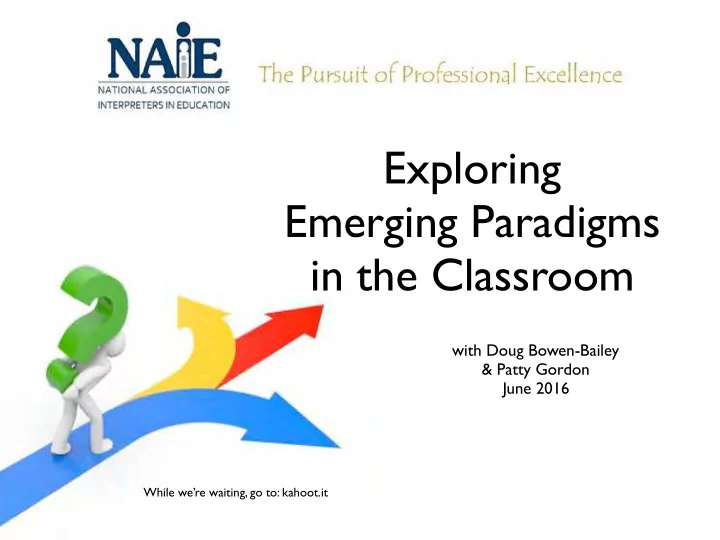

Exploring Emerging Paradigms in the Classroom with Doug Bowen-Bailey & Patty Gordon June 2016 While we’re waiting, go to: kahoot.it
About Us
About You
Then & Now How would you describe predominant & emerging paradigms for interpreters working in educational settings?
That was then?
This is now? with Doug Bowen-Bailey August 7, 2015
Changing Paradigms Interpreter as Technician Deontological Ethics Focus on interpreter actions & role Interpreter as Practice Professional T eleological Ethics Focus on consequences for participants & interpreter responsibilities/values Collaborator Dean & Pollard Witter-Merithew, Nicodemus, & Johnson
• Dialogic Work Analysis (Reflective Practice) Pre-Assignment During Assignment Post-Assignment Control Demand Consequence Resulting....
Continuum of Ethical Behavior Graphic and concept developed by Robyn Dean & Robert Pollard
Role-Space • from Robert Lee & Peter Llewellyn-Jones Axis of Interaction Management High Axis of Presentation of Self High Axis of Participant Alignment Hearing Deaf Low Low
From Llwellyn-Jones & Lee, CIT Conference 2012 Presentation
From Llwellyn-Jones & Lee, CIT Conference 2012 Presentation
From Llwellyn-Jones & Lee, CIT Conference 2012 Presentation
Connect the dots with 4 straight lines without lifting your pen.
Normative Framework
Anchoring Bias Daniel Kahneman, Thinking Fast and Slow
Antagonistic Autonomy
The Emerging Paradigm
From Llwellyn-Jones & Lee, CIT Conference 2012 Presentation
The Emerging Paradigm
Historical Foundations Betsy Winston - Interpretability Bern Jones – Accessibility Specialist
Generalist Specialist Versatilist • Versatilists are people who are “able to apply a depth of skill to a progressively widening scope of situations and experiences.” ~ Gartner Research, referenced in The World is Flat by Thomas Friedman
Systems Thinking
Descriptive & Normative Ethics
What Interpreters Do & Factors in Their Decisions 1. Assess and respond to a constellation of contextual, situational and human factors. 2. Interpret and/or transliterate. 3. Seek, obtain and capitalize on available resources. 4. Interact with others 5. Perform aid duties and other tasks. Be helpful. Smith. 2010. More than Meets the Eye. p. 110.
Understanding Language Development • BICS – Basic Interpersonal Communication Skills • CALP – Cognitive Academic Language Proficiency Cummins, 1979
Route ¡to ¡Bilingualism L ¡1 L ¡2 ¡ From a workshop by Jenny Gough and Tracy Ivy - "Promoting Self-Advocacy Skills for Students in Mainstream Settings.” -Originally from the Clerc Center at Gaulladet University.
Common ¡Order ¡of ¡Language ¡Acquisition L ¡1 L ¡2 ¡ From a workshop by Jenny Gough and Tracy Ivy - "Promoting Self-Advocacy Skills for Students in Mainstream Settings.” -Originally from the Clerc Center at Gaulladet University.
Power Dynamics
The Work of Justice
Embracing Complexity No culture has yet solved the dilemma each has faced with the growth of a conscious mind: How is one to live a moral and compassionate existence when one is fully aware of the blood, the horror inherent in life, when one finds darkness not only in one's culture but within oneself? If there is a stage at which an individual life becomes truly adult, it must be when one grasps the irony in its unfolding and accepts responsibility for a life lived in the midst of such paradox. One must live in the middle of contradiction, because if all contradiction were eliminated at once life would collapse. There are simply no answers to some of the great pressing questions. You continue to live them out, making your life a worthy expression of leaning into the light. Barry Lopez - Arctic Dreams
For more…. • Doug Bowen-Bailey dbb@digiterp.com • Patty Gordon pattygordon@mac.com • http://digiterp.com/new/ emerging-paradigms- naie-2016/
For more….
Recommend
More recommend